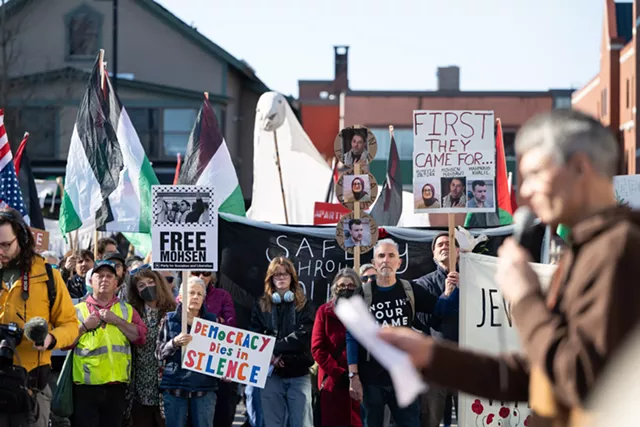Palestinian activist Mohsen Mahdawi will remain in custody for at least another week, a federal judge ruled on Wednesday, giving the Trump administration more time to justify why the 34-year-old White River Junction resident should be denied his freedom while his immigration case plays out.
Judge Geoffrey W. Crawford also extended for 90 days an order requiring the government to keep Mahdawi in Vermont.
Mahdawi, a Columbia University student with legal permanent residency in the U.S., was arrested on April 14 in Colchester at what he was told would be a citizenship interview. He has been held at the Northwest State Correctional Facility in St. Albans but appeared at the Burlington federal courthouse in person for Wednesday’s hearing.
Mahdawi remains in “good spirits,” said Cyrus Mehta, an immigration attorney from New York City who is part of Mahdawi’s legal team. Mehta met with Mahdawi after the hearing and transcribed a brief statement that he shared with members of the media and supporters outside the courthouse.
“Don’t lose hope,” Mahdawi said. “Stay positive and believe in the inevitability of justice.”
Protesters Decry Arrest of Vermont Man Who Advocated for Palestinians

Protesters Decry Arrest of Vermont Man Who Advocated for Palestinians
By Kevin McCallum
News
Mahdawi was a vocal but peaceful advocate for Palestinian rights in 2023 but had largely stepped away from those activities by the time protests engulfed Columbia and other campuses last year, according to his supporters.
A leaked memo from the Trump administration sought to justify Mahdawi’s arrest by claiming that his activism could “undermine the Middle East peace process by reinforcing antisemitic sentiment.”
His attorneys say that’s nonsense. Not only has he advocated against antisemitism, they say, but any of his pro-Palestinian activism must be protected under the First Amendment.
“Mohsen Mahdawi sits in a jail cell because of his lawful speech,” one of his attorneys, Luna Droubi, said at Wednesday’s hearing.
His attorneys asked the judge to release Mahdawi while his separate immigration case proceeds.
Hundreds of protesters assembled outside the Burlington courthouse ahead of Wednesday’s hearing carrying signs that read “Stop Abducting People” and featured photos of other students who have been detained recently.
Those include Mahmoud Khalil, a graduate of the School of International and Public Affairs who was an organizer of pro-Palestinian demonstrations at Columbia. Another, 30-year-old Rumeysa Ozturk, is a Tufts University student from Turkey whose case is also being heard in Burlington.
The trio of high-profile arrests have sparked numerous large protests, including one on Monday during which about 10 people chained themselves to the campus gates at Columbia University. On Tuesday, supporters of Mahdawi packed the Vermont Statehouse, where the House of Representatives passed a resolution calling for his release.
A motion filed by Mahdawi’s attorneys on Tuesday described the circumstances leading up to and following his April 14 arrest.
The filing says Mahdawi was notified in late March that his naturalization interview had been scheduled, marking the final step in his citizenship process after living in the U.S. for 10 years.
Mahdawi suspected that the meeting may be a ruse, the filing says. But he showed up anyway. He raised his right hand, answered the questions asked of him, and then signed a document signifying that he was willing to defend the U.S. Constitution “against all enemies, foreign, and domestic,’” the filing says.
“It was a trap,” the document continues.
Shortly after, an immigration official said he needed to “check” on some information and left the interview room. Armed agents with U.S. Immigration and Customs Enforcement then entered and shackled Mahdawi before whisking him into a car, the filing says.
His attorneys say ICE agents then attempted to quickly get him to the airport and onto a flight to Louisiana, where the Trump administration has shuttled other detained people in recent weeks, including Khalil and Ozturk.
They ultimately missed the flight after Mahdawi asked to use the bathroom, according to his attorneys. Their client recalled that the ICE agents’ faces fell when they were notified that a judge had granted an emergency motion that stopped the government from moving him out of Vermont.
His attorneys also submitted 94 letters from people and organizations who described him not as a threat but as a staunch advocate for peace.
“Mr. Mahdawi is a cherished member of his community, not a danger to it,” the filing says. “He has no criminal record, has demonstrated at every turn a commitment to peaceful advocacy, and has fostered friendships with individuals from all walks of life.”
The letters impressed Judge Crawford, who said he usually only hears from family members.
“These were quite striking in terms of their geographical breadth and philosophical breadth,” Crawford said, noting that some were from Jewish groups.
Still, Crawford said the government deserves a chance to respond and make their case for why Mahdawi should remain behind bars. He gave prosecutors until Monday to file a reply and said he would take up the question of detainment during another hearing on April 30.
Mehta, one of Mahdawi’s attorneys, said he understood the judge’s caution given the potential for an appeal should his client be released. But he said Mahdawi’s case demands urgency, since its ramifications will ripple across the country.
Hundreds of thousands of international students living in the U.S. now live in fear of being sent to prison simply for speaking out, he said.
“This case is of critical importance,” Mehta said.

